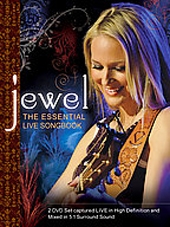BackTalk: Jewel Page 2
 |
You've said the live thing is a little more "real" for you. I grew up bar-singing with my dad ever since I was 6, and he really taught me to read the crowd. My dad never wrote a set list. He just could read the crowd, see what the mood was, and followed that. That's what I was trained to do. I don't like set lists; I just call songs out. Some audiences are energetic, some are tired and just got off of work and they don't want to be challenged that deep right away. You kind of have to roll them into it later. Some audiences want to have emotions - they want to have their hearts broken, they want to feel things, they want to cry. Every night will be different. It's a different animal every night. I get the most satisfaction out of what I do when I'm really in sync with the audience. I think they have a better experience that way too. It feels really neat.
Your storytelling moments in between songs seem to bring people into the show even more. They feel very genuine. Thank you. A lot of artists will use their music as propaganda to further their image as superhuman or supertalented. I've always kind of resisted that. I like feeling something that everybody gets to share, kind of like we're in my living room and getting to know each other. I don't like that distance between the audience and the artist. My shows gear themselves toward not being a daunting experience. It's something I enjoy. It's a little bit old school, but I really like those types of performers. Bette Midler is great at it too.
As somebody who tries not to be pigeonholed, how do you see the state of radio these days as opposed to when you started out? Radio is still a great partner if you want to use it to sell records. As the business model and record industry changes, when you have a hit song, radio still moves the needle the most. Not always, though; you can still have radio hits that's don't move records. It's that magic combination of having a radio hit and being able to properly promote the artist, not just a cure ditty you hear on the radio but an artist or somebody you actually feel moved enough by that you want to buy their album. It's a real balancing act.
It's fascinating as a songwriter to try and write songs that are smart and that you think will get radio play. It's easy to write a dumb song that you feel will be a hit. And it's easy to write a smart, artistic song that will never see the light of day. Putting those two things together is difficult, and something that's a fun challenge as a writer.
And it's also a lot to do with relationships. Like going into the country format - for [2008's Perfectly Clear], I did 250 radio visits in person, and I got to know the country side of things, a different format than what I've worked within before. So I really took my time, a good 9 months that I went around and introduced myself so that those radio programmers would really get to know me - and I'd get to know them.
Do you see your next studio project to be in a similar vein, or is it too early to tell? I have a couple of things I'd like to do. I do have another country album that will come out. I can also put out my own project in between, my own label releases. I can independently do a record, so I look forward to that. And then another country record, and I'll be out of my deal, and then I can hopefully goof around on my own. [chuckles]
How do you find the right balance between the technical side and the emotional side of a song? You have to realize the average fan doesn't understand what they're hearing. They understand that they're moved. Listening to records with my husband Ty [Murray, the rodeo champ], he'll say something like, "That sounds '70s," and I'll say, "That's because of the tone of the settings."
Do you and Ty watch DVDs or Blu-ray Discs when you have downtime? We do a little bit. I tend to watch everything on my computer or my iPhone, just because I travel so much.
Who are your favorite artists? I think that there's room for everything, but I have diverse tastes. I like listening to Maria Callas, and I also love listening to Loretta Lynn. I find that anybody's who's following their passion fervently to be really compelling, whether it's Joni Mitchell or Etta James. All of those influences have come out in my music and my writing.
What's your take on vinyl? I love vinyl. And I've signed quite a few album sleeves, like my first record, Pieces of You, a lot of my dance remixes, and limited editions of my albums. Now, it's hard to get your label to go along with it. It's an expense that's hard for them to feel good about. I don't think my current label would look at that and think it's worthwhile. [chuckles]
Speaking of my first album, I did a lot of Pieces at Neil Young's ranch, and one of the few things he said to me was, "Always go analog." [chuckles again] Good advice.
- Log in or register to post comments





























































